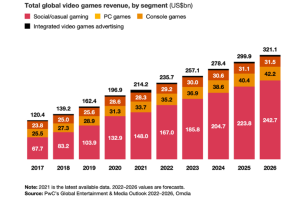
In recent years, the gaming industry has seen a significant shift towards cloud gaming services. This innovative technology has revolutionized the way people play and enjoy their favorite games. With the increasing availability of high-speed internet connections, cloud gaming has become a viable alternative to traditional gaming consoles and PCs. In this article, we will delve into the potential of cloud gaming services and how they are shaping the future of gaming.
What is Cloud Gaming?
Cloud gaming, also known as gaming on demand or gaming as a service, is a method of playing video games through a remote server network. Instead of using a local console or high-performance PC to run games, players can access and play games from a cloud platform via the internet. This eliminates the need for expensive hardware upgrades and allows gamers to enjoy their favorite titles on various devices with minimal latency.
The Advantages of Cloud Gaming Services
1. Access to a vast library of games: Cloud gaming services offer a wide range of games from different genres and platforms. Players can choose from a rich catalog, including both popular and indie titles, without the need to invest in specific hardware for compatibility. This provides an unparalleled level of convenience and variety for gamers.
2. Device flexibility: One of the biggest advantages of cloud gaming is the ability to play games on various devices. Whether it’s a smartphone, tablet, smart TV, or low-spec laptop, gamers can access their favorite titles as long as they have a stable internet connection. This versatility allows for seamless gaming experiences, enabling players to pick up where they left off across different devices.
3. Cost efficiency: Cloud gaming services eliminate the need for expensive gaming hardware, as the processing power required to run games is handled by remote servers. This significantly reduces upfront costs for gamers, making gaming more accessible to a wider audience. Additionally, cloud gaming services often offer subscription plans or pay-per-use models, allowing players to customize their gaming experience based on their preferences and budget.
4. Continuous updates and scalability: Cloud gaming platforms regularly update their servers with the latest hardware, ensuring that gamers have access to the most powerful technology. This eliminates the need for constant hardware upgrades and allows developers to create more visually stunning and complex games. Furthermore, cloud gaming services can easily scale their infrastructure to accommodate a growing user base, ensuring smooth gameplay even during peak hours.
The Challenges and Limitations
While cloud gaming holds immense potential, there are still some challenges and limitations that need to be addressed:
1. Internet connectivity: Since cloud gaming heavily relies on a stable and fast internet connection, areas with limited or unreliable internet access may face difficulties in accessing these services. Additionally, data caps imposed by internet service providers can restrict the amount of gameplay time or quality of graphics.
2. Latency and lag: While advancements in technology have significantly reduced latency, some players may still experience delays in gameplay due to the distance between their location and the cloud servers. For fast-paced and competitive games, even minute delays can affect the overall experience and performance.
3. Ownership and digital rights: With cloud gaming services, players do not physically own the games they play. Instead, they have a license to access and play the games for a specific duration. This raises concerns regarding ownership rights, especially when it comes to preserving access to games in the long term.
The Future of Cloud Gaming
The future of cloud gaming looks promising, with major tech companies investing heavily in the development and improvement of their cloud gaming platforms. As internet speeds continue to improve and 5G technology becomes more prevalent, we can expect reduced latency, higher quality graphics, and more immersive gaming experiences.
Moreover, game developers are increasingly creating games specifically designed for cloud gaming, taking advantage of the unique capabilities and possibilities offered by this technology. This will provide gamers with a whole new level of interactivity, responsiveness, and social integration.
In conclusion, cloud gaming services have the potential to reshape the gaming industry. From increased accessibility to cost efficiency and device flexibility, there are numerous benefits to be gained. While challenges remain, the future seems bright for cloud gaming as technology continues to evolve and overcome limitations. So, gear up and get ready for a gaming experience like never before!


